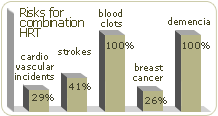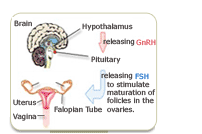34 MENOPAUSE SYMPTOMS |
HEALTH CENTER |
|
| |
|
|
|
|
|
|
Before making a decision about taking hormone replacement therapy, women should be aware of the numerous studies and trials that have demonstrated the potential dangers associated with HRT. Keep reading to get all the facts. |
|
Of course, the definitive study showing the dangers of HRT was the expansive Women's Health Initiative (WHI), launched by the National Institutes of Health (NIH) in 1991. The study took place from 1993 to 1998, following 161 809 postmenopausal women ranging in age from 50 to 70 years taking both estrogen-progestin and estrogen-alone HRT. The following graphs illustrate the results of the trial, which were published in JAMA in 2002. |
 |
|
|
- Postmenopausal Estrogen/Progestin Interventions Trial (PEPI): Tested effects on combination and estrogen-alone HRT on cardiovascular disease and osteoporosis, noting good results. Results were published in the Journal of the American Medical Association (JAMA) in 1995.
- Heart and Estrogen-Progestin Replacement Study (HERS): Tested effectiveness of combination HRT on prevention of recurrence of heart attack. The study found that during the first year of HRT, heart attack risk actually increased, and increased blood clots in legs and lungs as well. Results were published in JAMA in 1998.
- Nurse's Health Study (NHS): The Nurse's Health Study was begun to study the risk factors for chronic diseases in women. According to findings published in 1995 in the American Journal of Respiratory and Critical Care Medicine, use of HRT in postmenopausal women may increase risk for adult-onset asthma, and worsen already existing asthma.
|
|
Combination HRT was found to have the greatest amount of risk, which was independent of age, ethnicity, or other risk factors. The study also found that risk for breast cancer continues to increase the longer HRT is administered.
The WHI trials had to be stopped prematurely due to these health risks. Women considering HRT for managing menopause symptoms or preventing age-related disease should keep these results in mind and discuss them with a doctor. Keep reading for other guidelines to keep in mind when making a decision about hormone replacement therapy.  |
|
|
|
|
Hormone replacement therapy poses several serious health risks which typically outweigh the benefits the treatment may bring. Fortunately, safer, gentler, and equally effective options for alleviating menopausal symptoms do exist. Keep reading to learn more. |
|
|
|
|
Treating Hormonal Imbalance with
MacaActive Supplements |
|
Hormones such as estrogen, progesterone and testosterone play an essential role in several areas of the body, and as hormonal levels decline with age, the health implications can be significant. As women begin to notice the symptoms of hormone deficiency, they may want to consider taking steps to stabilize their hormonal production.
Today, there are three effective ways to normalize hormonal levels: lifestyle changes, alternative medicine and drugs & surgery.
|
|
 |
Lifestyle Changes: Lifestyle changes (such as an improved diet and increased exercise) are vital for overall health and for alleviating the symptoms of hormonal balance, but lifestyle changes alone will not have a significant impact on hormonal production. Most women will want to consider the next level of treatment, alternative medicine, which has proven to be excellent for treating hormonal imbalance in a safe and natural way.
|
|
 |
Alternative medicine: There are two types of herbal supplements for improving low estrogen levels: those containing phytoestrogenic herbs, and those containing non-estrogenic herbs. Phytoestrogenic herbs (like Black Cohosh) are filled with phytoestrogens, which are similar to estrogens. They can increase low estrogen levels by replacing some of the missing estrogen hormones. This isn't the best solution, however, because your body will become less responsive to producing estrogen on its own, causing a further decrease in body-own hormone levels. Unlike phytoestrogenic herbs, non-estrogenic herbs don't contain estrogen, but they nourish the hormonal glands to work more efficiently. This ultimately results in balancing not only estrogen, but other necessary hormones, as well. Using non-estrogenic herbs is one of the safest and best ways to treat hormonal imbalance naturally.
An excellent example of a safe and effective non-estrogenic herb for estrogen deficiency is herbal MacaActive. What makes MacaActive so special is its ability to balance hormonal levels in women by nourishing the hormonal glands. In this way, it alleviates most disorders related to hormonal imbalance.  to read more about MacaActive. to read more about MacaActive.
|
|
 |
Drugs and Surgery: This level of treatment has the highest risk and often the highest cost. The most common drug therapy for treating hot flashes in the US is hormone replacement therapy (HRT). There's no doubt that this is the quickest and strongest way to combat hormonal imbalance. Unfortunately, it entails serious side effects and increases the risk of different types of cancer in women. If you still want to consider this approach, see your doctor to learn more about what this treatment option involves.
|
|
A safe way for balancing hormones:
Non-estrogenic herbs are the most effective solution for treating hormonal deficiency.
MacaActive is an excellent non-estrogenic herb. It's simple: rather than putting hormones from the outside into your body artificially, MacaActive stimulates your hormone glands into producing the necessary hormones naturally. This is what makes MacaActive supplements so unique.  to read all about MacaActive. |
 |
|
 |
|
|
|







